人教版高中英语必修1 Unit1 Friendship reading&grammar 课件(57张)
文档属性
| 名称 | 人教版高中英语必修1 Unit1 Friendship reading&grammar 课件(57张) |

|
|
| 格式 | zip | ||
| 文件大小 | 627.7KB | ||
| 资源类型 | 教案 | ||
| 版本资源 | 人教版(新课程标准) | ||
| 科目 | 英语 | ||
| 更新时间 | 2018-09-07 00:00:00 | ||
图片预览

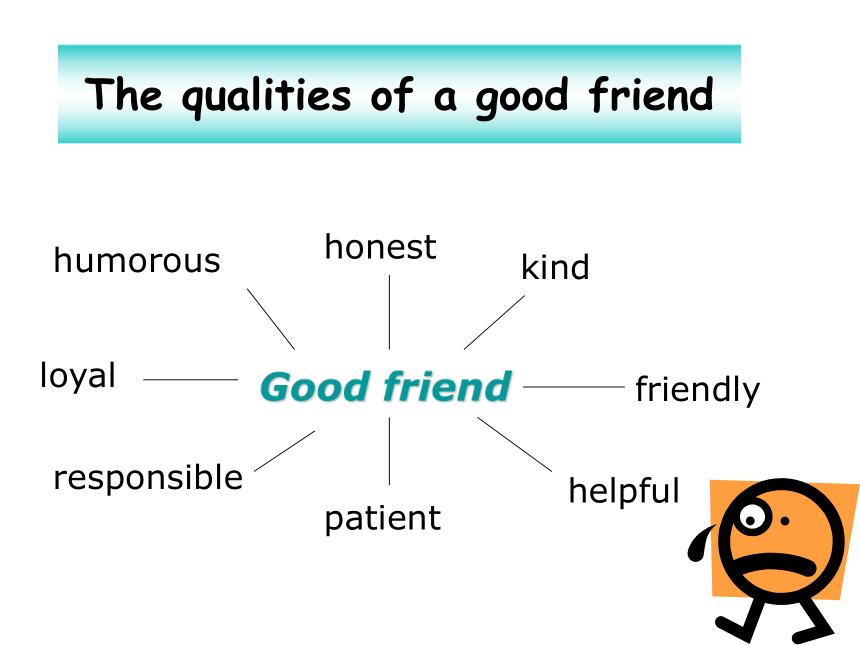
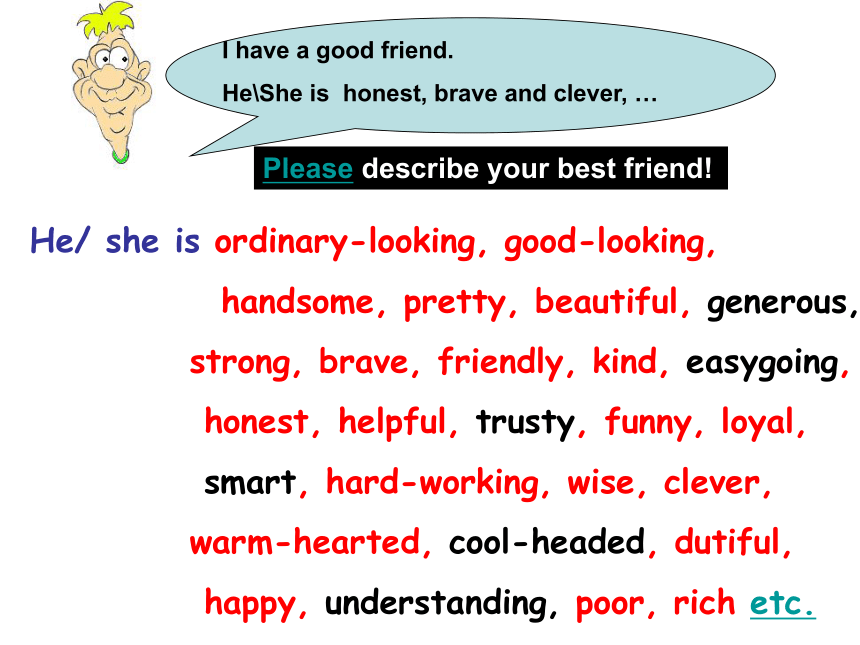


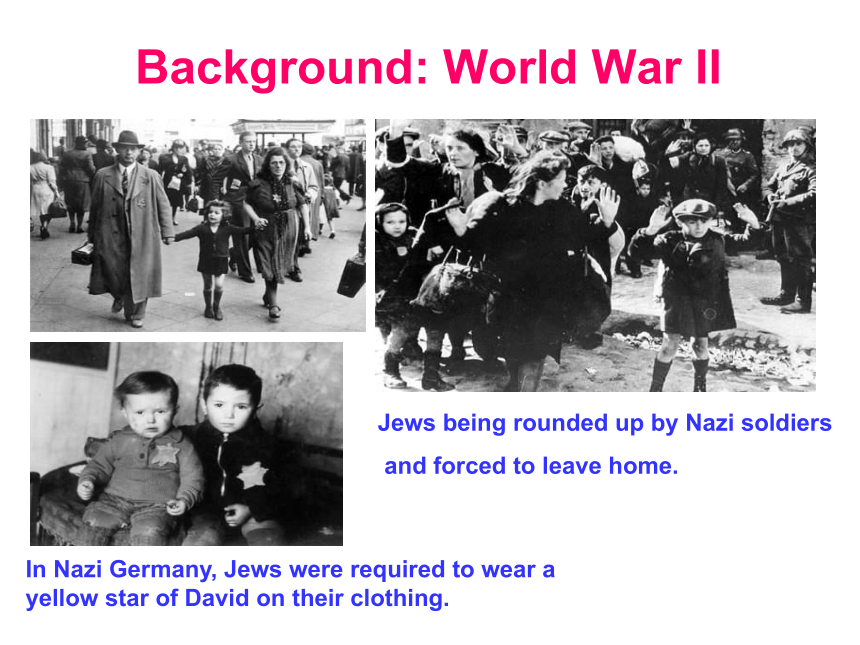
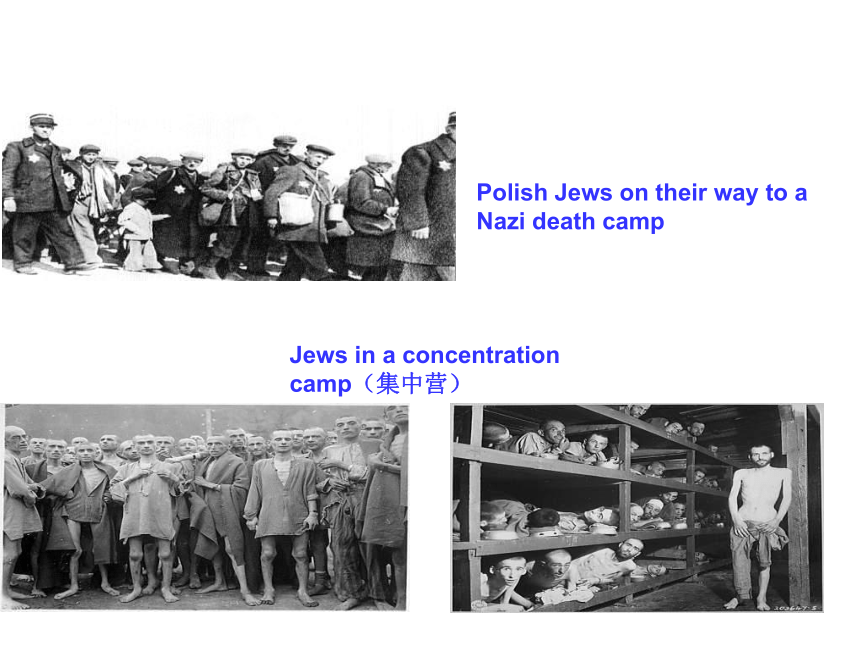
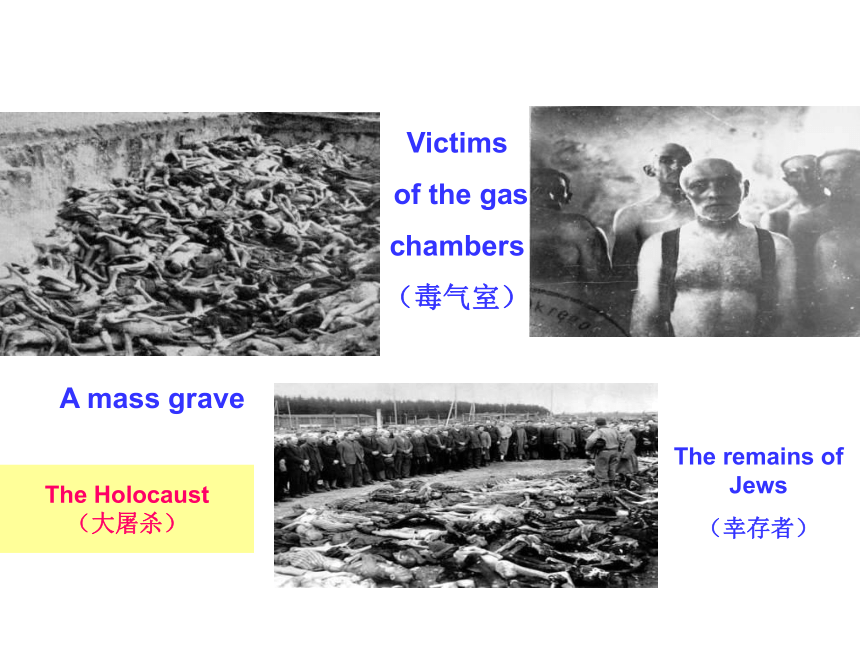
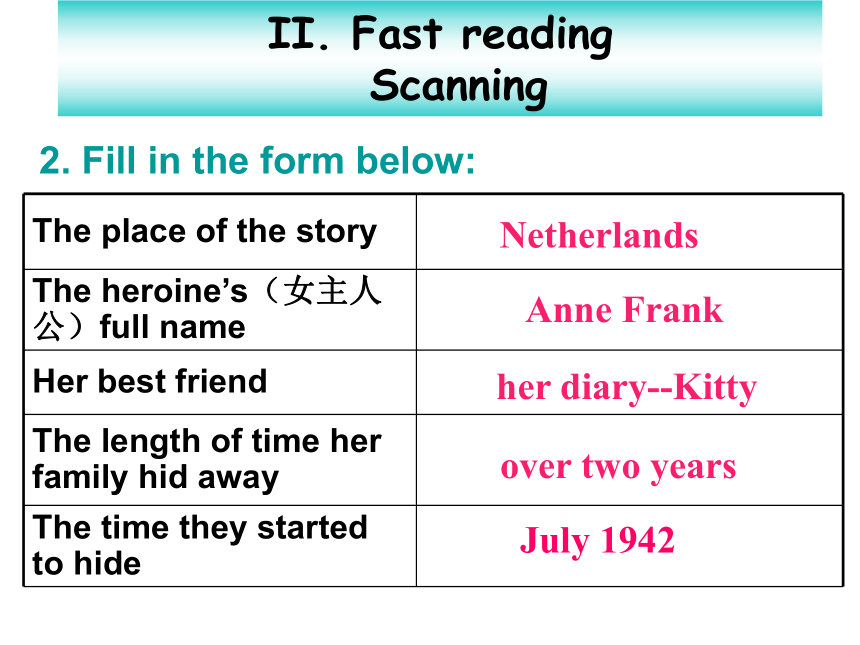
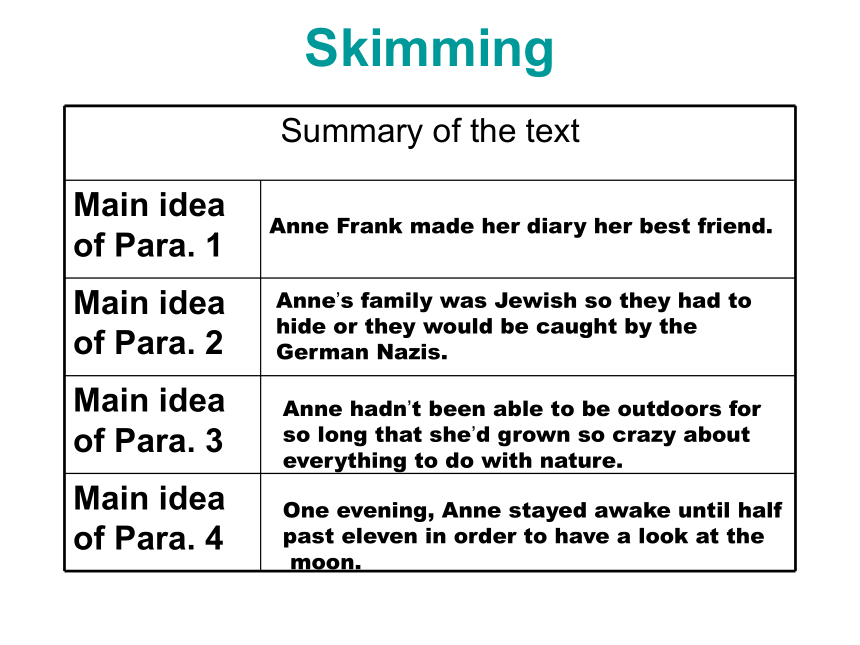
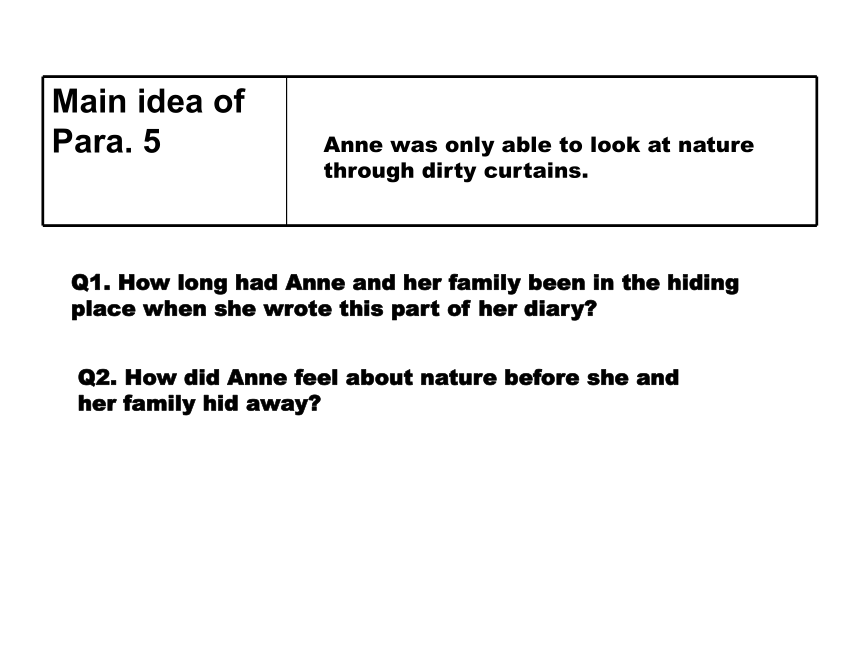
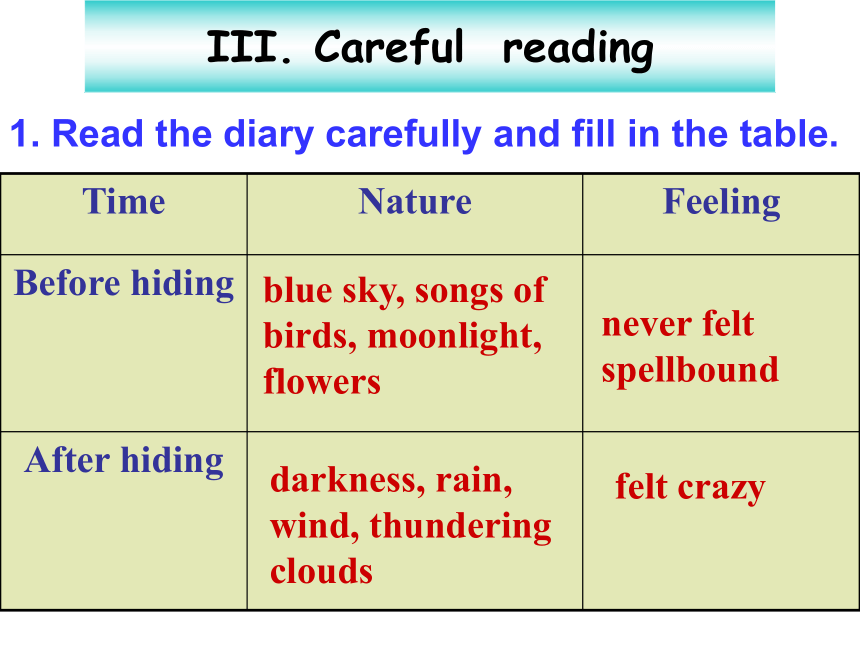
文档简介
课件57张PPT。Unit1 FriendshipGood friend
honestkind
friendly
helpful
humorous
responsible
loyalpatientThe qualities of a good friendI have a good friend.
HeShe is honest, brave and clever, …Please describe your best friend!He/ she is ordinary-looking, good-looking,
handsome, pretty, beautiful, generous,
strong, brave, friendly, kind, easygoing,
honest, helpful, trusty, funny, loyal,
smart, hard-working, wise, clever,
warm-hearted, cool-headed, dutiful,
happy, understanding, poor, rich etc.Work in groups of four. Tell your group mates how you reflect on these questions.
Why do you need friends? Make a list of reasons why friends are important to you.
Does a friend always have to be a person? What else can be a friend?
Do you think a diary can become your friend? Why or why not?I. Pre-reading Here is a model of a brainstorming map. The topic question is “Why do you need friends?” Make a list of reason why friends are important to you.
Why do you need friends?To help me with my homeworkTo calm me down when I am upsetBackground: World War II In Nazi Germany, Jews were required to wear a yellow star of David on their clothing.Jews being rounded up by Nazi soldiers
and forced to leave home.Polish Jews on their way to a Nazi death campJews in a concentration camp(集中营)A mass graveThe remains of Jews
(幸存者)The Holocaust (大屠杀)Victims
of the gas
chambers
(毒气室)2. Fill in the form below:Netherlands Anne Frank her diary--Kitty over two yearsJuly 1942II. Fast reading
ScanningSkimming Anne Frank made her diary her best friend. Anne’s family was Jewish so they had to
hide or they would be caught by the
German Nazis. Anne hadn’t been able to be outdoors for
so long that she’d grown so crazy about
everything to do with nature. One evening, Anne stayed awake until half
past eleven in order to have a look at the
moon. Anne was only able to look at nature
through dirty curtains. Q1. How long had Anne and her family been in the hiding
place when she wrote this part of her diary? Q2. How did Anne feel about nature before she and
her family hid away? 1. Read the diary carefully and fill in the table.blue sky, songs of birds, moonlight, flowers never felt spellbounddarkness, rain, wind, thundering cloudsfelt crazy III. Careful readingFast reading3. Join the correct parts of the sentences.Anne kept a diary because
She felt very lonely because
They have to hide because
Anne named her diary
Kitty becauseshe couldn’t meet her friends.
Jews were caught by Nazis and put away.
she could tell everything to it.
she wanted it to be her best friend. IV DifficultiesPick out the difficult sentences from the reading passage. Discuss in groups of four and work out the meaning together. Difficulties1. I wonder if it’s because I haven’t been able to be outdoors for so long that I’ve grown so crazy about everything to do with nature.
2. I can well remember that there was a time when a deep blue sky, the song of the birds, moonlight and flowers could never have kept me spellbound.
3. It was the first time in a year and a half that I’d seen the night face to face…
4. I am only able to look at nature through dirty curtains hanging before very dusty windows. Difficulties1. I wonder if it’s because I haven’t been able to be outdoors for so long that I’ve grown so crazy about everything to do with nature.it’s because…grow/be crazy about…something/anything/everything to do with…我不知道这是不是因为我很久无法出门的缘故,我变得对一切与大自然有关的事物都无比狂热。2. I can well remember that there was a time when a deep blue sky, the song of the birds, moonlight and flowers could never have kept me spellbound.Difficulties我记得很清楚,以前,湛蓝的天空、鸟儿的歌唱、月光和鲜花,从未令我心迷神往过。spellbind v. 吸引人;迷人when 引导的定语从句(划线部分)修饰句中的time4. I am only able to look at nature through dirty curtains hanging before very dusty windows. hanging before very dusty windows 现在分词短语, 修饰curtains.我只能透过肮脏的窗帘看大自然,窗帘悬挂在沾满灰尘的窗前。DifficultiesTell him/her that he/she should have studied….你告诉他他本来应该学习,…
should have done
过去应该做某事而实际上没有做,含有责备的意思
You shouldn’t have left without saying good-bye.
shouldn’t have done 过去不应该做某事而实际上做了,含有责备的意思。
You could have passed the exam but you just were lazy.
I would have gone to your party but I was busy.本来可以做成某事,而实际上没有做本来打算做某事,但实际上没有做Do you want a friend whom you could tell everything to, like your deepest feelings and thoughts? like 为介词 = such asYou want a friendYou want a friend
You could tell everything to缺少宾语 a friend whom 从句起到修饰作用,修饰前面的名词 a friend.形容词修饰名词作定语定语从句I wonder if it is because I haven’t been able to be outdoors for so long that I have grown so crazy about every about nature.I wonder if/whether 我想知道是否我想知道我们是否还能见面。I wonder if /whether we could meet again.状语从句主句I have grown so crazy about every about nature
because I haven’t been able to be outdoors for so
long.It is ….that我不知道这是不是因为我很久无法出门的缘故,我变得对一切与大自然有关的事物都无比狂热。It is…… that强调句
结构:It is +强调部分+ that +剩余句子部分
我昨天在街上遇见了Tom
I met Tom in the street yesterday.
强调主语
强调宾语
强调地点状语
强调时间状语不能强调动词It was I that met Tom in the street yesterday.It was Tom that I met in the street yesterday.It was in the street that I met Tom yesterday.It was yesterday that I met Tom in the street.
I can well remember that there was a time when a deep blue sky, the song of the birds, moonlight and flowers could never have kept me spellbound.我记得很清楚,以前,湛蓝的天空、鸟儿的歌唱、月光和鲜花,从未令我心迷神往过。spellbind v. 吸引人;迷人when 引导的定语从句(划线部分)修饰句中的timeIt was the first time in a year and a half that I had seen the night face to face.某人第几次做某事
It is the second time that Tom has been to Beijing.
It was the second time that Tom had been to Beijing.
这是我第二次去北京。那是我第二次去北京。It is/was +the+序数词+time+that+主语+完成时态 I am only able to look at nature through dirty curtains hanging before very dusty windows. hanging before very dusty windows 现在分词短语, 修饰curtains.我只能透过肮脏的窗帘看大自然,窗帘悬挂在沾满灰尘的窗前。Go through
1 These countries have gone through too many wars.
2 It took us a whole week to go through the forest.
To my joy, she has gone through all the exams.
3 I had just gone through the work when the telephone rang.4 You must ____ your papers before you hand them in.
A. go down. B. go across. C. go out. D. go through.经历,经受穿过,通过完成,做完仔细检查D…make it the best friend make +宾语+ 宾补
1 安妮把他的日记当做最好的朋友。
2 这个有趣的故事使他很高兴。
3 他们把房子收拾得干净而整洁。
4 他们让男孩站在树下。
5 老师讲的很慢,以便能让学生理解他。(in order to )
Anne made her diary her best friend.The interesting story made him very happy.They have made the house clean and tidy.They made the boy stand under the tree.The teacher spoke very slowly in order to make herself understood.Set down
1 She listened carefully and set down every word he said.
He was asked to set down the facts in the notebook.
2 He set down the heavy boxes and rested for a while .写下,记下放下,卸下stay awake
1.stay: 保持,表示待在一个地方或处在某种情况。
1). 他现在待在家里。
2). 一连三天都是好天气。
3). 商店一直开到八点。 He is staying in the house now. The weather stayed fine for three days. The shop stays open until 8 p.m.. 2. awake 醒着的
他睡着还是醒着?
Is he awake or asleep?awake 为表语形容词, 不做定语。类似词有:
afraid, alive, alone, asleep, etc.1. in order to / so as to
1).为了看清楚我带上了眼镜。
2). 为了取得进步,他学习努力了。
I put on my glasses in order to /so as to see it clearly, In order to make progress, he worked hard.2 so that/ in order that + 句子
1)I put on my glasses _______ I can see it clearly.2)为了让学生听懂, 老师讲得很慢。The teacher spoke slowly ____________ the students could understand him.It is / was …….that / who ………E.g. Jack broke a glass yesterday afternoon
at his uncle’s home.1) It was Jack that / who broke a glass yesterday afternoon at his uncle’s home.(强调主语)2) It was a glass that Jack broke yesterday afternoon at his uncle’s home.(强调宾语)3) It was yesterday afternoon that Jack broke a glass at his uncle’s home.(强调时间状语)4) It was at his uncle’s home that Jack broke a glass yesterday afternoon. (强调地点状语)
It /This is the first time that …(现在完成时)
It /That was the first time that …(过去完成时)There was a time when ….1 有一段时间我步行上学。2 这是我第一次来北京。3 那是他第二次上班迟到。There was a time when I went to school on foot.This is the first time that I have been in Beijing.It was the third time that the man had been late for work. GrammarDirect and indirect speech时态的变化:
1.当主句动词为一般现在时或现在完成时的时候,从句动词时态不变。
1)She often says, “ All men and women are equal under the law.”
变为:She often says that all men and women are equal under the law.
2)“You did very well,” I have just told Tom.
变为:I have just told Tom that he did very well.2. 主句谓语动词为一般过去时的时候,从句谓语动词要发生相应的变化。一般现在时
现在进行时
现在完成时
现在完成进行时
一般过去时
过去进行时
过去完成时
一般将来时一般过去时
过去进行时过去完成时过去完成进行时过去完成时过去完成进行时过去完成时过去将来时注意:下列情况时态不变。
1)不变的真理。
The teacher said to the students, ”Water freezes when the temperature falls below zero.”
改为:The teacher told the students that water freezes when the temperature falls below zero.
2.经常的习惯。
He said to the doctor, “ I smoke two packs every day.”He told the doctor that he smokes two packs every day.3. 历史事件。
The teacher said ,” World War II ended in 1945.”The teacher said that World War II ended in 1945.”
4.部分情态动词,如must, ought to, used to, had better 等。
She said to me,” You must hurry up.”She said that I must hurry up.代词、形容词、副词、动词的变化。
this
these
now
ago
today
tomorrow
the day after tomorrow
yesterday
last night
the day before yesterday
go
bring
herethat/thisthose/thesethenbeforethat day/todaythe next dayin two days’ timethe day beforethe night beforetwo days beforecome /gobring/ takethere/hereRelated exercises:He asked ____ for the violin.
Did I pay how much B. I paid how much
C. how much did I pay D. how much I paid
2. Someone is ringing the doorbell. Go and see _____.
who is he B. who he is C. who is it D. who it is
3. Can you tell me ____?
how good is his spoken English
B. how well his spoken English is
C. how well he speaks English
D. how good he can speak English4. He said that he had bought the jacket____.
before three days B. three days before
C. three days ago D. last week
5. Did you say_____?
A. that what he said was true
B. that it was true that he said
C. what did he say was true
D. what he said it was true
6. Please tell me ____ from.
where do you come B. where you come
C. where you will come D. there you come直接引语:
直接引用别人的原话,并在原话前后加引号。
例:He said:" It is too late."
间接引语:
用自己的话转述他人的话,多数以宾语从句的形式构成。
例:He said it was too late.直接引语与间接引语相互转化时应注意的变化 1.句式结构上的变化 解题步骤:1). 陈述句变间接引语时,用that连接, that 无实际意义,可省略。例 :“I don’t like computers,” Sarah said to her friends.Sarah said to her friendsthat saiddidn’tsheSarah said to her friends that she didn’t like computers.Sarah2).一般疑问句,选择疑问句变间接引语时,要用陈述语气,并要加连词if或whether。
“Is it easy to improve the condition of the soil?”,
they asked himThey asked himif /
whetherit is easy to improve the condition of the soil.askedwasThey asked him if it was easy to improve the condition of the soil.3).特殊疑问句变间接引语要用特殊疑问词引导。
They asked him “ When do you harvest the wheat ?”They asked himwhenyou harvest the wheat.heharvestedThey asked him when he harvested the wheat.2.时态变化?????????? 直接引语变间接引语时,间接引语的时态要与主句的时态一致.1) 主句为一般现在时或一般将来时的时候,间接引语时态不变。
He says:" I bought you a book yesterday.”
He says that he bought me a book yesterday.2).当主句为过去时,从句要跟着相应的变化,变化如下: 一般现在时?
现在进行时?
现在完成时?
一般将来时?
一般过去时?
过去完成时?
过去进行时?一般过去时
过去进行时
过去完成时
过去将来时
过去完成时
不变
不变往前推一个时态1.“I am very glad to visit your school”, she said.?
She said that she was very glad to visit our school.?
2. Tom said, “We are listening to the pop music.”
Tom said that they were listening to the pop music.?
3. Mother asked, “Have you finished your homework before you watch TV?”
Mother asked me whether I had finished my homework before I watched TV.? 4. He asked the conductor, “Where shall I get off ??to change to a No. 3 bus?”
He asked the conductor where he would get off to change to a No. 3 bus.?
5. “Why did she refuse to go there?” the teacher asked.?
The teacher asked why she had refused to go there.?
6. Mother asked me, “Had you finished your homework?before you watched TV?”
Mother asked me whether I had finished my homework before I watched TV.直接引语里的第一人称和第二人称,变间接引语时,人称要做相应调整。例如:
直接引语 She said:“ I am hungry。”
间接引语 She said she was hungry.
直接引语 Mum said to me:“ You can clean your bedroom tomorrow.”
间接引语 Mum told me that I could ?clean my bedroom the next day .
Mr. Smith said,“He is a good worker. ’’
Mr. Smith said that he was a good worker. 3.人称的变化“一主、二宾、三不变”4.其他变化 直接引语 间接引语指示代词 时 间 状 语 地点状语 方向性动词 this, that, these those
now,
today ,
this week
yesterday
last week
four days ago
tomorrow
next monththen,
that day
that week
the day before
the week before
four days before
the next day
the next month
here there come, go,bring take Summary 陈述句
一般疑问句
特殊疑问句
祈使句that引导
if/whether 引导
原疑问词引导
ask / told sb to do sth.1.主句为现在时态
2.主句为过去时态时态不变
往前推一个时态第一人称
第二人称
第三人称与主句主语人称一致
与主句宾语人称一致
不变……句式结构时态人称其他宾语从句语序疑问句陈述句语序
honestkind
friendly
helpful
humorous
responsible
loyalpatientThe qualities of a good friendI have a good friend.
HeShe is honest, brave and clever, …Please describe your best friend!He/ she is ordinary-looking, good-looking,
handsome, pretty, beautiful, generous,
strong, brave, friendly, kind, easygoing,
honest, helpful, trusty, funny, loyal,
smart, hard-working, wise, clever,
warm-hearted, cool-headed, dutiful,
happy, understanding, poor, rich etc.Work in groups of four. Tell your group mates how you reflect on these questions.
Why do you need friends? Make a list of reasons why friends are important to you.
Does a friend always have to be a person? What else can be a friend?
Do you think a diary can become your friend? Why or why not?I. Pre-reading Here is a model of a brainstorming map. The topic question is “Why do you need friends?” Make a list of reason why friends are important to you.
Why do you need friends?To help me with my homeworkTo calm me down when I am upsetBackground: World War II In Nazi Germany, Jews were required to wear a yellow star of David on their clothing.Jews being rounded up by Nazi soldiers
and forced to leave home.Polish Jews on their way to a Nazi death campJews in a concentration camp(集中营)A mass graveThe remains of Jews
(幸存者)The Holocaust (大屠杀)Victims
of the gas
chambers
(毒气室)2. Fill in the form below:Netherlands Anne Frank her diary--Kitty over two yearsJuly 1942II. Fast reading
ScanningSkimming Anne Frank made her diary her best friend. Anne’s family was Jewish so they had to
hide or they would be caught by the
German Nazis. Anne hadn’t been able to be outdoors for
so long that she’d grown so crazy about
everything to do with nature. One evening, Anne stayed awake until half
past eleven in order to have a look at the
moon. Anne was only able to look at nature
through dirty curtains. Q1. How long had Anne and her family been in the hiding
place when she wrote this part of her diary? Q2. How did Anne feel about nature before she and
her family hid away? 1. Read the diary carefully and fill in the table.blue sky, songs of birds, moonlight, flowers never felt spellbounddarkness, rain, wind, thundering cloudsfelt crazy III. Careful readingFast reading3. Join the correct parts of the sentences.Anne kept a diary because
She felt very lonely because
They have to hide because
Anne named her diary
Kitty becauseshe couldn’t meet her friends.
Jews were caught by Nazis and put away.
she could tell everything to it.
she wanted it to be her best friend. IV DifficultiesPick out the difficult sentences from the reading passage. Discuss in groups of four and work out the meaning together. Difficulties1. I wonder if it’s because I haven’t been able to be outdoors for so long that I’ve grown so crazy about everything to do with nature.
2. I can well remember that there was a time when a deep blue sky, the song of the birds, moonlight and flowers could never have kept me spellbound.
3. It was the first time in a year and a half that I’d seen the night face to face…
4. I am only able to look at nature through dirty curtains hanging before very dusty windows. Difficulties1. I wonder if it’s because I haven’t been able to be outdoors for so long that I’ve grown so crazy about everything to do with nature.it’s because…grow/be crazy about…something/anything/everything to do with…我不知道这是不是因为我很久无法出门的缘故,我变得对一切与大自然有关的事物都无比狂热。2. I can well remember that there was a time when a deep blue sky, the song of the birds, moonlight and flowers could never have kept me spellbound.Difficulties我记得很清楚,以前,湛蓝的天空、鸟儿的歌唱、月光和鲜花,从未令我心迷神往过。spellbind v. 吸引人;迷人when 引导的定语从句(划线部分)修饰句中的time4. I am only able to look at nature through dirty curtains hanging before very dusty windows. hanging before very dusty windows 现在分词短语, 修饰curtains.我只能透过肮脏的窗帘看大自然,窗帘悬挂在沾满灰尘的窗前。DifficultiesTell him/her that he/she should have studied….你告诉他他本来应该学习,…
should have done
过去应该做某事而实际上没有做,含有责备的意思
You shouldn’t have left without saying good-bye.
shouldn’t have done 过去不应该做某事而实际上做了,含有责备的意思。
You could have passed the exam but you just were lazy.
I would have gone to your party but I was busy.本来可以做成某事,而实际上没有做本来打算做某事,但实际上没有做Do you want a friend whom you could tell everything to, like your deepest feelings and thoughts? like 为介词 = such asYou want a friendYou want a friend
You could tell everything to缺少宾语 a friend whom 从句起到修饰作用,修饰前面的名词 a friend.形容词修饰名词作定语定语从句I wonder if it is because I haven’t been able to be outdoors for so long that I have grown so crazy about every about nature.I wonder if/whether 我想知道是否我想知道我们是否还能见面。I wonder if /whether we could meet again.状语从句主句I have grown so crazy about every about nature
because I haven’t been able to be outdoors for so
long.It is ….that我不知道这是不是因为我很久无法出门的缘故,我变得对一切与大自然有关的事物都无比狂热。It is…… that强调句
结构:It is +强调部分+ that +剩余句子部分
我昨天在街上遇见了Tom
I met Tom in the street yesterday.
强调主语
强调宾语
强调地点状语
强调时间状语不能强调动词It was I that met Tom in the street yesterday.It was Tom that I met in the street yesterday.It was in the street that I met Tom yesterday.It was yesterday that I met Tom in the street.
I can well remember that there was a time when a deep blue sky, the song of the birds, moonlight and flowers could never have kept me spellbound.我记得很清楚,以前,湛蓝的天空、鸟儿的歌唱、月光和鲜花,从未令我心迷神往过。spellbind v. 吸引人;迷人when 引导的定语从句(划线部分)修饰句中的timeIt was the first time in a year and a half that I had seen the night face to face.某人第几次做某事
It is the second time that Tom has been to Beijing.
It was the second time that Tom had been to Beijing.
这是我第二次去北京。那是我第二次去北京。It is/was +the+序数词+time+that+主语+完成时态 I am only able to look at nature through dirty curtains hanging before very dusty windows. hanging before very dusty windows 现在分词短语, 修饰curtains.我只能透过肮脏的窗帘看大自然,窗帘悬挂在沾满灰尘的窗前。Go through
1 These countries have gone through too many wars.
2 It took us a whole week to go through the forest.
To my joy, she has gone through all the exams.
3 I had just gone through the work when the telephone rang.4 You must ____ your papers before you hand them in.
A. go down. B. go across. C. go out. D. go through.经历,经受穿过,通过完成,做完仔细检查D…make it the best friend make +宾语+ 宾补
1 安妮把他的日记当做最好的朋友。
2 这个有趣的故事使他很高兴。
3 他们把房子收拾得干净而整洁。
4 他们让男孩站在树下。
5 老师讲的很慢,以便能让学生理解他。(in order to )
Anne made her diary her best friend.The interesting story made him very happy.They have made the house clean and tidy.They made the boy stand under the tree.The teacher spoke very slowly in order to make herself understood.Set down
1 She listened carefully and set down every word he said.
He was asked to set down the facts in the notebook.
2 He set down the heavy boxes and rested for a while .写下,记下放下,卸下stay awake
1.stay: 保持,表示待在一个地方或处在某种情况。
1). 他现在待在家里。
2). 一连三天都是好天气。
3). 商店一直开到八点。 He is staying in the house now. The weather stayed fine for three days. The shop stays open until 8 p.m.. 2. awake 醒着的
他睡着还是醒着?
Is he awake or asleep?awake 为表语形容词, 不做定语。类似词有:
afraid, alive, alone, asleep, etc.1. in order to / so as to
1).为了看清楚我带上了眼镜。
2). 为了取得进步,他学习努力了。
I put on my glasses in order to /so as to see it clearly, In order to make progress, he worked hard.2 so that/ in order that + 句子
1)I put on my glasses _______ I can see it clearly.2)为了让学生听懂, 老师讲得很慢。The teacher spoke slowly ____________ the students could understand him.It is / was …….that / who ………E.g. Jack broke a glass yesterday afternoon
at his uncle’s home.1) It was Jack that / who broke a glass yesterday afternoon at his uncle’s home.(强调主语)2) It was a glass that Jack broke yesterday afternoon at his uncle’s home.(强调宾语)3) It was yesterday afternoon that Jack broke a glass at his uncle’s home.(强调时间状语)4) It was at his uncle’s home that Jack broke a glass yesterday afternoon. (强调地点状语)
It /This is the first time that …(现在完成时)
It /That was the first time that …(过去完成时)There was a time when ….1 有一段时间我步行上学。2 这是我第一次来北京。3 那是他第二次上班迟到。There was a time when I went to school on foot.This is the first time that I have been in Beijing.It was the third time that the man had been late for work. GrammarDirect and indirect speech时态的变化:
1.当主句动词为一般现在时或现在完成时的时候,从句动词时态不变。
1)She often says, “ All men and women are equal under the law.”
变为:She often says that all men and women are equal under the law.
2)“You did very well,” I have just told Tom.
变为:I have just told Tom that he did very well.2. 主句谓语动词为一般过去时的时候,从句谓语动词要发生相应的变化。一般现在时
现在进行时
现在完成时
现在完成进行时
一般过去时
过去进行时
过去完成时
一般将来时一般过去时
过去进行时过去完成时过去完成进行时过去完成时过去完成进行时过去完成时过去将来时注意:下列情况时态不变。
1)不变的真理。
The teacher said to the students, ”Water freezes when the temperature falls below zero.”
改为:The teacher told the students that water freezes when the temperature falls below zero.
2.经常的习惯。
He said to the doctor, “ I smoke two packs every day.”He told the doctor that he smokes two packs every day.3. 历史事件。
The teacher said ,” World War II ended in 1945.”The teacher said that World War II ended in 1945.”
4.部分情态动词,如must, ought to, used to, had better 等。
She said to me,” You must hurry up.”She said that I must hurry up.代词、形容词、副词、动词的变化。
this
these
now
ago
today
tomorrow
the day after tomorrow
yesterday
last night
the day before yesterday
go
bring
herethat/thisthose/thesethenbeforethat day/todaythe next dayin two days’ timethe day beforethe night beforetwo days beforecome /gobring/ takethere/hereRelated exercises:He asked ____ for the violin.
Did I pay how much B. I paid how much
C. how much did I pay D. how much I paid
2. Someone is ringing the doorbell. Go and see _____.
who is he B. who he is C. who is it D. who it is
3. Can you tell me ____?
how good is his spoken English
B. how well his spoken English is
C. how well he speaks English
D. how good he can speak English4. He said that he had bought the jacket____.
before three days B. three days before
C. three days ago D. last week
5. Did you say_____?
A. that what he said was true
B. that it was true that he said
C. what did he say was true
D. what he said it was true
6. Please tell me ____ from.
where do you come B. where you come
C. where you will come D. there you come直接引语:
直接引用别人的原话,并在原话前后加引号。
例:He said:" It is too late."
间接引语:
用自己的话转述他人的话,多数以宾语从句的形式构成。
例:He said it was too late.直接引语与间接引语相互转化时应注意的变化 1.句式结构上的变化 解题步骤:1). 陈述句变间接引语时,用that连接, that 无实际意义,可省略。例 :“I don’t like computers,” Sarah said to her friends.Sarah said to her friendsthat saiddidn’tsheSarah said to her friends that she didn’t like computers.Sarah2).一般疑问句,选择疑问句变间接引语时,要用陈述语气,并要加连词if或whether。
“Is it easy to improve the condition of the soil?”,
they asked himThey asked himif /
whetherit is easy to improve the condition of the soil.askedwasThey asked him if it was easy to improve the condition of the soil.3).特殊疑问句变间接引语要用特殊疑问词引导。
They asked him “ When do you harvest the wheat ?”They asked himwhenyou harvest the wheat.heharvestedThey asked him when he harvested the wheat.2.时态变化?????????? 直接引语变间接引语时,间接引语的时态要与主句的时态一致.1) 主句为一般现在时或一般将来时的时候,间接引语时态不变。
He says:" I bought you a book yesterday.”
He says that he bought me a book yesterday.2).当主句为过去时,从句要跟着相应的变化,变化如下: 一般现在时?
现在进行时?
现在完成时?
一般将来时?
一般过去时?
过去完成时?
过去进行时?一般过去时
过去进行时
过去完成时
过去将来时
过去完成时
不变
不变往前推一个时态1.“I am very glad to visit your school”, she said.?
She said that she was very glad to visit our school.?
2. Tom said, “We are listening to the pop music.”
Tom said that they were listening to the pop music.?
3. Mother asked, “Have you finished your homework before you watch TV?”
Mother asked me whether I had finished my homework before I watched TV.? 4. He asked the conductor, “Where shall I get off ??to change to a No. 3 bus?”
He asked the conductor where he would get off to change to a No. 3 bus.?
5. “Why did she refuse to go there?” the teacher asked.?
The teacher asked why she had refused to go there.?
6. Mother asked me, “Had you finished your homework?before you watched TV?”
Mother asked me whether I had finished my homework before I watched TV.直接引语里的第一人称和第二人称,变间接引语时,人称要做相应调整。例如:
直接引语 She said:“ I am hungry。”
间接引语 She said she was hungry.
直接引语 Mum said to me:“ You can clean your bedroom tomorrow.”
间接引语 Mum told me that I could ?clean my bedroom the next day .
Mr. Smith said,“He is a good worker. ’’
Mr. Smith said that he was a good worker. 3.人称的变化“一主、二宾、三不变”4.其他变化 直接引语 间接引语指示代词 时 间 状 语 地点状语 方向性动词 this, that, these those
now,
today ,
this week
yesterday
last week
four days ago
tomorrow
next monththen,
that day
that week
the day before
the week before
four days before
the next day
the next month
here there come, go,bring take Summary 陈述句
一般疑问句
特殊疑问句
祈使句that引导
if/whether 引导
原疑问词引导
ask / told sb to do sth.1.主句为现在时态
2.主句为过去时态时态不变
往前推一个时态第一人称
第二人称
第三人称与主句主语人称一致
与主句宾语人称一致
不变……句式结构时态人称其他宾语从句语序疑问句陈述句语序
